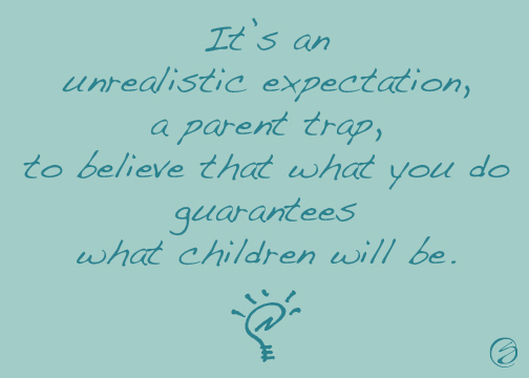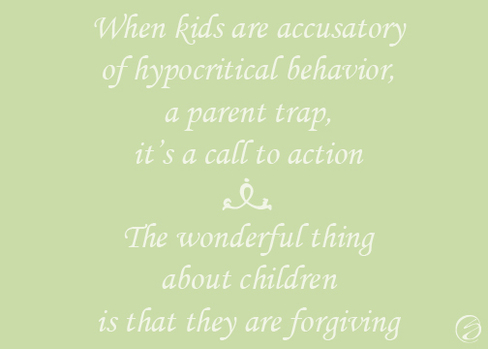|
I do not know where people, religious people in particular, get this idea in parenting but it exists - If we do this (whatever it is) then we are guaranteed to get that (whatever is attached to this). Okay, I kinda do know where the idea comes from, religiously speaking. But, how did we start applying it to parenting? And in "apply it to parenthood" I mean - If I do 'this' then my kids will (guarantee) to do/get 'that'. By espousing that application we've created a parent trap - satisfaction guaranteed. Parent Trap: Satisfaction GuaranteedHow do we know if we are in this trap? It's framed in our real lives something like this, "We've taught her/him better than that, this shouldn't be happening." Try this, "We've never done X in our home, how could (s)he get into that." Or this, "We've gone to church every week, I don't know how this could happen." If you've heard or said that, it's the snare of thinking that our efforts at being good or doing good as parents are somehow guarantees that our children will be good and do good. As parents we want an outcome (great kids) so bad that we walk willingly into this trap.The reality is that there are no guarantees in parenting. Let me repeat that - Parent Reality: There are NO Guarantees in ParentingLet that settle in a little. That can be an overwhelming realization. Which is naturally followed by thoughts of "why bother", "what's the point" or "I can't win" in parenting. But that's just looking at the problem from one point of view. Albeit a compelling one. But, to truly know where you stand on something you've actually got to move around it a bit. Let's look at it from this angle - Knowing there are no guarantees of good kids gives you permission for freedom. This is kind of cerebral but I'll try my best to explain my thoughts. Now that we are released from the previous parent trap we can switch it around a little, get in a different mental position. What about this - "since nothing is guaranteed I am free to try whatever I think might bring about what I am hoping for." Or, "If I do this and it's not guaranteed to come out that way then I am free to try something else." If the "input" doesn't guarantee "output" then you are free to add other things, omit things, and be creative in what we bring to the parenting table. For example: You want spirituality for your youth. You take them to church thinking that the action will "guarantee" spirituality. When you realize there are no guarantees from that act then you can add other ideas (like surrounding your child with spiritual friends, having one on one discussions about your spiritual journey, or give them instructions on how to personally pray) thus increasing the possibility, not the guarantee, of a spiritually strong youth. It's not being good or doing good as a parent that's the problem. It's the unrealistic expectation that what you do guarantees what they will be. Now, that doesn't mean just give up on things that have been proven to give the greatest benefit to children. We always want to increase ours, and their chances at success. But, to unequivocally expect certain results, regardless, is a parent trap. Here are 5 tips to help get past the trap and increase the likelihood of satisfaction.
Checklist for Change • 5 Tips1. Release yourself from the trap. Acknowledge that what you do may not produce what you want. There are no guarantees to parenting outcome. Free yourself from that thinking. 2. Release your child from being the maker for your parent satisfaction. Your child's behavior shouldn't be how you judge your efforts as a parent. Your parental expectations should be independent of their choices. 3. Do things from a different angle. Keep your eyes on what you think is helpful or needful for the child, not the intended outcome. Listen to your parenting instincts. 4. Don't let other's set the trap for you. Don't be held to someone else's expectations of "should", "shouldn't", "would" or "wouldn't". And don't succumb to the pressure of other's comments or criticism, instead, deliberately dictate the direction you want your parenting to take. 5. Be patient with yourself and your child. It takes time to get out of a trap. Sometimes we're wounded in the process of being trapped and it takes time to nurse and heal the wound. Take time to let the process happen. All we get when we do something, is increase our chances of an outcome a bit. Add to the likelihood that something could happen. I know what I do doesn't guarantee satisfaction. And I'm good with that. Add another tip to keep out of this trap.
0 Comments
When my older children were young we decided to omit certain words from our family vocabulary. Words like "stupid" and "shut-up" we felt weren't respectful of each other and shouldn't be used toward each other. On one particular day I was frustrated with something and called it "stupid". Oh man, my children were indignant. They didn't differentiate between things and people and were convinced that my behavior didn't match up with our established expectations. And when they went to church the following Sunday they reported my bad behavior to their teachers - "my mom said the 's' word!" Luckily for me, I learned to control those words, even toward things, and their trust in me was restored. Though this may be minor on the scale of moral mishaps the idea of hypocrisy can be very destructive. Before we continue I like to define the critical words in the conversation so that we start out on the same terminology page, so to speak. HYPOCRISY the practice of professing standards and beliefs contrary to one's real character a pretense of having a virtuous character contrary to actual behavior a pretense of moral or religious belief that one does not really possess a pretense of having some desirable or publicly approved attitude an act or instance of hypocrisy dictionary.com To sum up, hypocrisy is practiced pretense. At times kids, teens in particular, have a real problem with their parents because of this practiced pretense or hypocrisy. Parents who don't act as they preach fall into this parent trap. The integrity trip-up, hypocrisy. And teens hate hypocrites! It doesn't have to be "major" deviations from professed piousness, minor detours will accomplish parental captivity. For those of religious belief, we automatically set ourselves up. We are preachers of something and when we fail at what we teach we are by definition hypocrites. Parent Trap: |
|||||||||||||
| Parent Trap • Hypocrisy.pdf | |
| File Size: | 24 kb |
| File Type: | |
CHECKLIST FOR CHANGE
• determine that the offense is worth the efforts to change it
• dedicate yourself to living in harmony to your code of conduct
• declare your intentions of working to improve a behavior to others
• draw on the goodness in you, in others and the love of family
• devote your best energies to rectify your reputation
• don't underestimate the power of your example
Archives
August 2012
June 2012
May 2012
March 2012
February 2012
January 2012
December 2011
November 2011
October 2011
September 2011
July 2011
June 2011
May 2011
April 2011
February 2011
December 2010
October 2010
September 2010
August 2010
July 2010
June 2010
Categories
All
Activity
Appreciation
Art
Art & Books
Articles
Bitesized Organized
Biz
Branding
Chores
D I Y
Downloads
Exhibitions
Family
Frame Art
Gifts
Graphic
How To
Kids
Marriage
Moments
Morals
Opinion
Paintings
Parenting
Parent Traps™
Parties
Photos
Policy
Project
Projects
Quick Tips
Ring Thing
Shortcuts
Social Media
Teens
Thoughts
Tips
Trips
Values
Wedding
Women
Work
Youth
Yw


 RSS Feed
RSS Feed